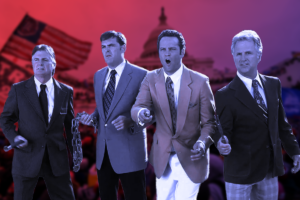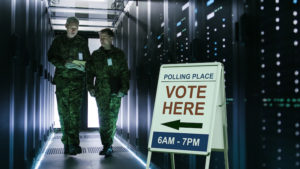George Carlin’s Daughter Calls for a Second Look at ‘Political Correctness’
"We can pretend that [political correctness will] make a better world because we’ll all be pleasant with each other, but if you don’t know about the Nazis and who they are, then they become the hidden enemy," says Kelly Carlin (shown), daughter of the late comedian.While well-intended in its origins, political correctness today is “an interesting mixing of progressive ideals with fascist tactics,” a combination that helped Donald Trump win the GOP nomination, says Kelly Carlin, daughter of the late comedian George Carlin.
Kelly Carlin was speaking with fellow comedian Karith Foster, of the Foundation for Individual Rights and Education (FIRE), in July at the Helium Comedy Club in Philadelphia. Joining her were Rain Pryor and Kitty Bruce, daughters of late comedians Richard Pryor and Lenny Bruce, respectively.
Pryor, who is black, affirmed and added to Carlin’s remarks: “In comedy now, what I’m finding is that audiences are so divided because of this thing called political correctness. It’s like we’re afraid to laugh at what is painful. … We’re afraid to go to that line and cross it. And then if we do cross it, we’re not crossing it for the sake of enlightenment. We’re now crossing it to say ‘Fuck you.’ And it leaves a bad taste in my mouth, like the word ‘pussy.’ ”
The group laughed. Carlin later elaborated on her critique of political correctness.
My dad kind of had these daddy teaching moments with me where he would like make sure that I understood, in the ’60s especially; I was born in ’63, so by ’69 I was 6, 7 during all of that stuff. My dad went to do Kent State and we went with him, and he took me to the memorial where the kids had been shot a few years earlier. My dad made sure that I understood what was going on. I was there in Summerfest when my dad got arrested for saying the “seven dirty words” onstage. So it was a real life day-to-day thing for me, and it felt very dangerous to live the life we were living that time. We were on the side of the freaks. Nixon was in the White House. This was not an easy time to be different in this country. So for me, I’ve always had a passion for it, I think building on my father’s shoulders, but also understanding that it is the marketplace of ideas, that whether you like someone else’s speech or not, I will die to protect your right to say it because then I’m hoping you’ll protect my right to say it too. And it’s hard being an American with that, you know, because you have to let the Nazis march through Skokie, Ill., and things like that. But without it none of us have the freedom to speak; and if you don’t have the freedom to speak, you really don’t have the freedom to think, either. …
It’s really interesting, I think, about political correctness on campus. This was a big issue in the early ’90s also. … I went back to UCLA later at 25, and by ’91, ’92 I was part of the communications department and actually ended up doing a symposium on political correctness. My dad came and was a part of it, because it had just started to rear its head back then. And here’s the interesting thing about it: Political correctness is based on identity politics; it’s about people wanting to claim the right to speak from their own subjective point of view, “I’m a gay person, a black person. I’m a woman.” Whatever it is. It’s all about identity politics. It’s all about, “I am this, and this is my life experience.” This is a really important thing for our civilization and society, to be able to have that voice, for all these oppressed voices to finally speak out and to define themselves.
The problem that happens is that then it becomes about the thought police. “I want to define myself this way, and I want to make sure that you define me this way too. And you don’t get to define me any other way.” And that’s when we get into trouble, because now I’m controlling what you want to think and what you want to say. And yes we can pretend that that’ll make a better world because we’ll all be pleasant with each other; but … if you don’t know about the Nazis and who they are, then they become the hidden enemy and people pretend that everything’s fine. And isn’t it all lovely and daisies? And yet people are plotting horrible things in dark rooms. So it’s actually going backward. …
Studying the themes, I talk a lot about it, and one of the things I love about what my father said about it is that it’s about tolerance ultimately. Identity politics is about tolerance, but not tolerating someone’s speech in service of tolerance, so intolerance in service of tolerance, does not work. … it’s about the marketplace of ideas. It’s not just about me declaring, “I am a woman, this is my perspective,” but it’s about learning to have conversation. And because of identity politics we no longer know how to have a conversation in this culture anymore. It has completely divided us between right and left, and no one knows how to sit down, and that’s why Congress does not function anymore. We don’t have a government that functions. And that’s why we are getting an election like we’re getting right now. And everyone’s getting more cynical and more turned off by it all.
So, you know it comes from a great place. Its intention is good and it’s important for our culture, but shutting down what people can say and what their comedy is and making everything “beige” is not good for democracy in the end. And so I think we’re going through some difficult growing pains around all of this stuff. And it will play out. And it’s fascinating. I mentioned Trump earlier. This is why we got Trump. It’s not politically correct. It’s refreshing. He says what’s on his mind. It’s not pleasant to listen to, but this is America. Politicians don’t speak, they’ve become so beige. And we all sit there watching politicians, going, ‘Oh, he doesn’t really mean, that. He doesn’t really mean that.’ …
So that’s my take on it: It’s an interesting mixing of progressive ideals with fascist tactics, political correctness in general.
Check out the video of the three daughters, above.
—Posted by Alexander Reed Kelly.
Your support is crucial…With an uncertain future and a new administration casting doubt on press freedoms, the danger is clear: The truth is at risk.
Now is the time to give. Your tax-deductible support allows us to dig deeper, delivering fearless investigative reporting and analysis that exposes what’s really happening — without compromise.
Stand with our courageous journalists. Donate today to protect a free press, uphold democracy and unearth untold stories.





